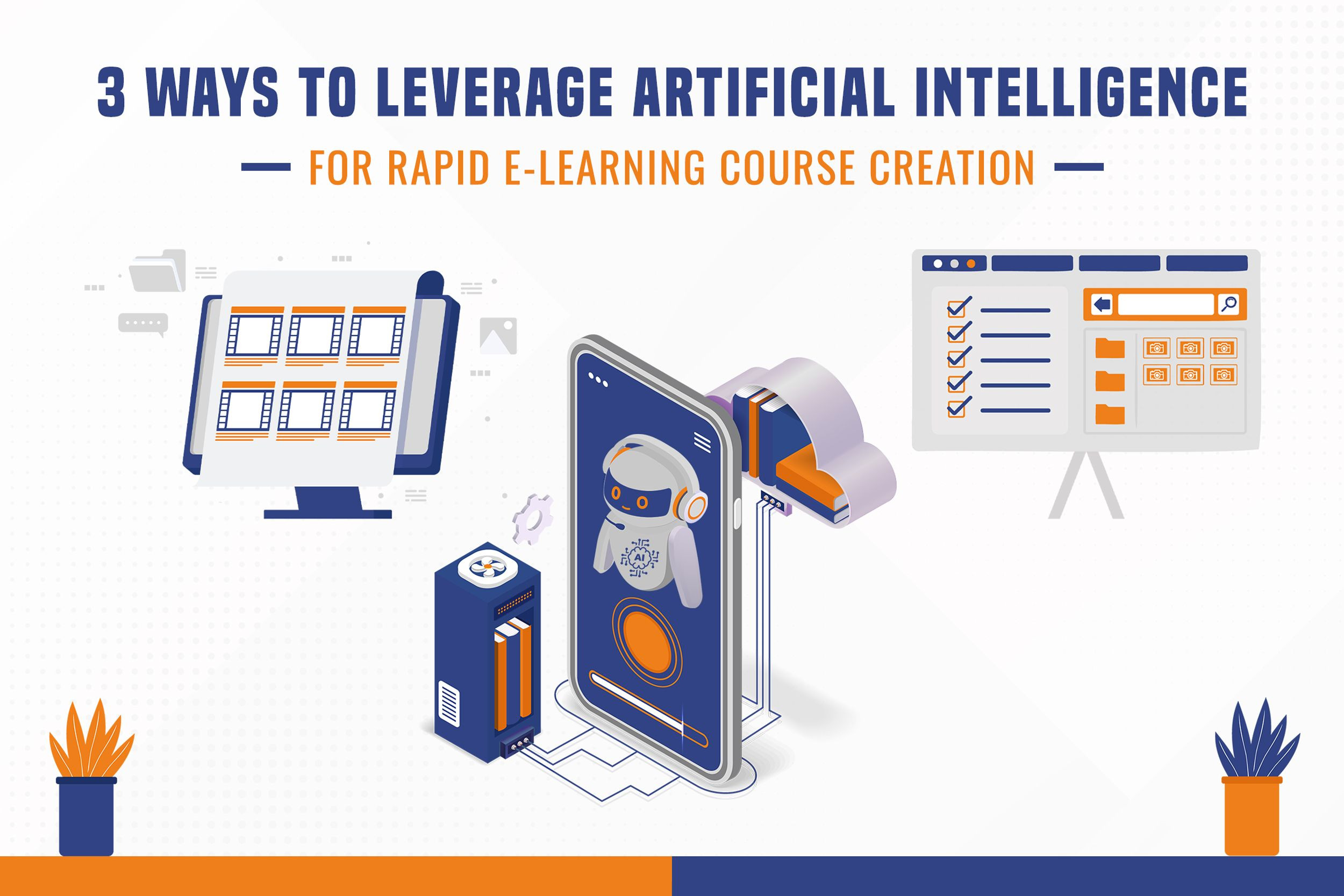
3 Ways To Leverage Artificial Intelligence For Rapid E-Learning Course Creation
In today's fast-paced world, eLearning has become an essential part of education and training. With the advancements in technology, particularly artificial intelligence (AI), creating eLearning courses has become more efficient and effective. AI has revolutionized the way we develop and deliver eLearning content, allowing for rapid course creation while maintaining high-quality standards. In this article, we will explore three ways to leverage artificial intelligence for rapid eLearning course creation, highlighting the benefits and best practices.
3 Effective Ways To Use AI For Rapid eLearning Course Creation
1. Leveraging Natural Language Processing (NLP)
One of the most significant advancements in AI is natural language processing (NLP). NLP enables computers to understand, interpret, and generate human language. When it comes to eLearning course creation, NLP can be leveraged in multiple ways.
Improving Content Creation Efficiency
Incorporating NLP algorithms enables eLearning course creators to streamline content creation processes by automating the generation of course materials. Utilizing AI-powered tools, these algorithms analyze educational content, extract essential concepts, and generate course materials for Leadership Development eLearning using predefined templates.
This efficient approach not only saves valuable time but also ensures consistency and high-quality content across various modules. By leveraging AI in content creation, eLearning courses can maintain a cohesive and top-notch learning experience for students.
Enhancing Learner Interactions
To enhance learner interactions, the implementation of NLP extends to the creation of intelligent chatbots or virtual assistants. These AI-driven chatbots are designed to offer personalized support to learners by understanding and responding to their queries, providing guidance, and even simulating interactive conversations.
By seamlessly integrating NLP-based chatbots into eLearning courses and eLearning Content Management Systems, students can benefit from instant assistance, fostering a more engaging and effective learning experience. The availability of responsive and interactive chatbots empowers learners with real-time support, promoting active participation and facilitating their journey toward knowledge acquisition.
2. Harnessing Machine Learning Algorithms
Another powerful aspect of AI for eLearning course creation is machine learning (ML). ML algorithms enable systems to learn from data and make predictions or decisions without explicit programming. Leveraging ML can greatly enhance the efficiency and effectiveness of the course development process.
Adaptive Learning Paths
ML algorithms enable eLearning Content Management Systems to analyze learner data comprehensively, including performance, preferences, and learning styles, in order to develop adaptive learning paths. These tailored learning paths are designed to cater to the unique requirements of each learner, providing them with content and activities that are highly relevant and beneficial to their individual learning journey.
By harnessing the power of ML, eLearning courses become increasingly learner-centric, fostering enhanced engagement and promoting better retention of knowledge. The personalized nature of adaptive learning paths empowers students to maximize their learning potential, facilitating a more effective and rewarding educational experience.
Automated Assessment and Feedback
In eLearning courses, ML algorithms play a crucial role in automating the assessment and feedback process. Through the analysis of learner responses and patterns, AI-powered systems are capable of delivering instant feedback, evaluating assignments, and generating customized assessments.
This automation not only saves valuable time for instructors but also ensures that learners receive prompt feedback on their progress, contributing to a faster and more efficient learning experience. By leveraging automated assessment and feedback mechanisms, eLearning courses promote continuous learning and improvement, empowering learners to gauge their performance and make necessary adjustments in real-time.
3. Utilizing Content Recommendation Systems
Content recommendation systems powered by AI can play a crucial role in rapid eLearning course creation. These systems analyze learner data, course materials, and contextual information to recommend relevant and personalized content.
Personalized Content Delivery
eLearning platforms can greatly enhance the learning experience by utilizing AI-driven content recommendation systems for personalized content delivery. These systems analyze various factors such as learners' preferences, learning styles, and performance data to provide tailored content for Leadership Development eLearning.
By aligning the content with individual needs and goals, learners receive educational materials that resonate with their specific requirements, making the learning journey more engaging and effective. This personalized approach ensures that learners receive the most relevant and impactful content, maximizing their potential for knowledge absorption and retention. With AI-powered personalized content delivery, eLearning becomes a customized and enriching experience for every learner.
Continuous Improvement and Updates
AI-powered content recommendation systems play a vital role in facilitating continuous improvement and updates in eLearning courses Leadership And Management Training Courses. These systems leverage learner feedback, engagement metrics, and performance data to analyze the effectiveness of the course content. By identifying areas for improvement, these AI systems can suggest updates and modifications to ensure that the eLearning content remains current, up-to-date, and relevant.
This dynamic approach enables instructors and course developers to fine-tune the curriculum, address gaps, and incorporate new information or methodologies as needed. By embracing AI for continuous improvement and updates, eLearning courses can provide learners with the most accurate, valuable, and cutting-edge educational experiences.
Final Words
Artificial intelligence has revolutionized the eLearning landscape, providing powerful tools and techniques to create rapid and engaging courses. By leveraging natural language processing, machine learning, and content recommendation systems, eLearning course creators can streamline the course creation process, personalize learning experiences, and continuously improve course content. As AI continues to evolve, the future of eLearning holds even more exciting possibilities. So, embrace the power of artificial intelligence and unlock the full potential of rapid eLearning course creation.
